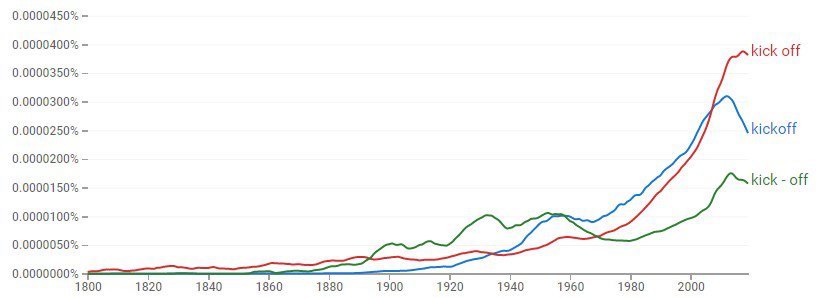Some words only differ in punctuation and space. But they have different definitions and parts of speech.
Is kickoff one word or two? The short answer is, it’s both. There’s also a hyphenated version kick-off meaning the start of something. Keep reading to learn the difference between kickoff, kick-off, and kick off!
Is it Kick Off or Kickoff?
Both are correct terms. Kickoff is an adjective and a noun, while kick off is the corresponding phrasal verb. The noun kickoff refers to the start of something, as in the kickoff of a holiday. The verb kick off means to start something.
What is the Difference Between Kickoff, Kick-Off, and Kick Off?
It can be spelled as one word or two depending on its use. Use kickoff or kick-off as a noun to refer to the start of something–for example:
- The show’s kickoff will be at noon.
- The show’s kick-off will be at noon.
The hyphenated word kick-off is a variant spelling of the closed compound noun, which is more common in British English.
Kick off is a phrasal verb that means to start something–for example:
- The show will kick off at noon.
When to Use Kickoff
Use it to refer to the start or beginning of something. The word is mostly used in sporting events. In American football, the noun can even mean the team kicking the ball toward the opponent. Here’s an example:
- The team has been staggering ever since the kickoff.
- The time of the kickoff for Real Madrid vs. Barcelona is not yet announced.
But you can also use it in other contexts that do not include sports–for example:
In the kickoff to a thriller series for young adults, Julie Cross introduces time traveler Jackson Meyer. [Los Angeles Times]
Kick-off is also an adjective that describes a noun that comes first. It can be something in a sports event, meeting, seminar, etc. Check out these examples:
- I’m throwing a kickoff party for his first game.
Join us for a Zoom kickoff event today at 10 AM for an overview of editing Wikipedia and a chance to ask questions. [West Virginia University]
In the first example, kickoff modifies the word party. And in the second example, describes event.
The non-hyphenated spelling is famous in American English. Kickoff is the recommended spelling in the AP Stylebook.
When to Use Kick-Off
The British spelling is kick-off meaning the start of something–for example:
- My daughter can’t wait for the kick-off party.
- This kick-off event is going to be game-changing.
It can also be an adjective to modify a noun–for example:
It represents the kick-off point for a much-improved business year that will see several other new and facelifted Peugeot models arrive. [Taranaki Daily News]
When to Use Kick Off
Use the verb when there is an action to be taken. As you see, the separated two words, when combined, means to start something. It’s similar to the phrasal verbs follow up and pick up. You’ll read or hear the words in sporting events and shows–here are some examples of unhyphenated kickoff:
Things kick off with 2001’s MGS2, less a sequel than a postmodern meta-commentary on the game that preceded it. [Guardian]
City officials said as many as 10,000 people attended the event, which was meant to kick off a series of similar demonstrations across the country. [New York Times].
William and Kate kick off their royal tour in this tiny Central American country next week. [Daily Mail]
Other definitions for the verb kick off include:
- To rid something from one’s body.
- To remove or eliminate someone from a group.
- To remove shoes by kicking one’s feet.
- To disconnect from an online platform.
- To die.
Is Kick Off an Idiom?
Yes. The verb phrase kick off can be an idiom because its meaning is not deducible from the words kick and off. Definitions for kickoff as an idiom can mean to start something. It can also mean to rid something.
Kickoff or Kick Off in Canada
Canadian English follows the American spelling kickoff when referring to the noun or adjective. But the verb form is still kick off like any other English-speaking country.
Summary of Kickoff, Kick-Off, and Kick Off

Now you know the answer to the question, is the closed compound kickoff one word or two? The statistics for kickoff show the most commonly used term is with a space. But here’s a recap:
- Use the hyphenated kick-off for the start of something in British spelling.
- Use kickoff as a noun or an adjective in American and Canadian English.
- Use kick off as a verb that means to start something.
